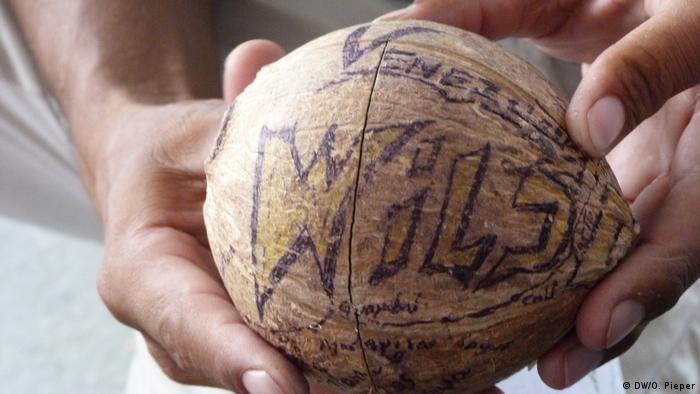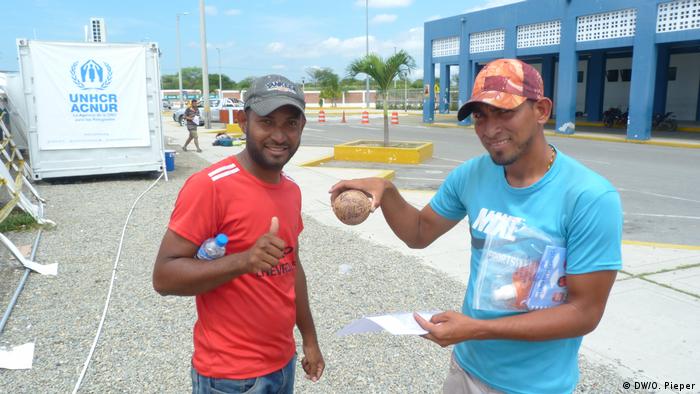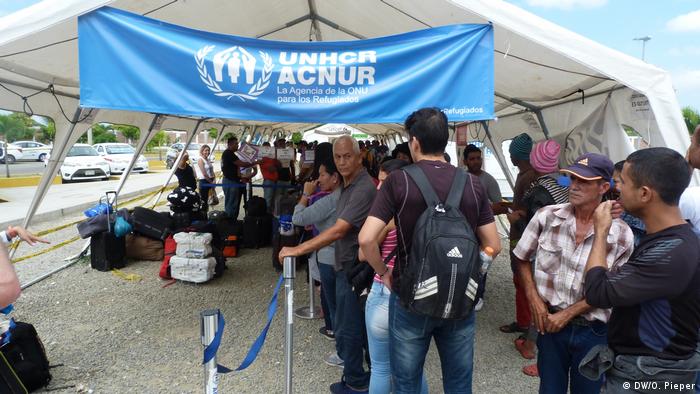In the Film “Lost” is a Volleyball named “Wilson” for the constant companion of Tom Hanks. Some Venezuelan refugees baptize a coconut on the same name and reaching all along Peru.

His luck Carlos Alberto Jiménez hits in Colombia. As the 28-Year-old achieved on the run from his native Venezuela, the border town of Cúcuta, give him a friend a bag full of coconuts to sell them on the street. Jiménez, sold all but one. And calls it “Wilson”. “I had to think in the Moment the movie with Tom Hanks, because I was in a similar Situation,” says the Venezuelan, who has just achieved with his coconut, the Peruvian border town of Tumbes.

Carlos Alberto Jiménez (left) and another refugee from his group are proud to present their lucky charm
In the Film “Missing” stranded Tom Hanks alias Chuck Noland landed after a plane crash on a desert island, at some point, a football is flushed to the island. “Wilson,” as Hanks baptizing him, is his constant companion, a silent friend and conversation partner in difficult times. Similar has also done Jiménez‘ “Wilson”, he says, in the two weeks March from Cúcuta to Tumbes. “With the only difference that our ‘Wilson’ is not a Volleyball, but a coconut!”
Many Venezuelans are fleeing in groups
“Wilson” has become to Tumbes to the luck of eight refugees from Venezuela. In Cúcuta, they were third to fifth on the next Station in Colombia, Bucaramanga. Many of the Venezuelans get together on their escape. Suffering shared is more than half a sorrow. In addition, it is traveling in a group is much safer. “We have those who go with us, and also selected very carefully,” says Jiménez, “we just wanted to have good people with us.”

90 percent of the refugees who come to Peru, to reach the country via Tumbes. There you will be first vaccinated
To belong to the group of refugees from Jiménez also two women. “We don’t always look that we are going to a lot of and you can rest. Also, you get more to eat than we do.” Up to Lima, the journey will go still further, and a further 1000 kilometres. With the help of “Wilson” and from the top, so Jiménez. “Every night we sit down together, pray to God and think about what time we get up and up to what city we will go the next day.”
“Wilson” also serves as a travel diary
All stations are listed on the coconut meticulously, as well as the numbers of people who have encountered the group on the run. “Tom Hanks has to fight in the movie every day in order to survive. And so it goes for us, too,” emphasized Jiménez, has repaired in Venezuela, air-conditioning systems of cars and his wife and three children to leave. “In addition, Wilson has brought ‘‘ Hanks to always think positive and not give up. And that’s what we do. If one hangs out in our group times, we build it again.”

To high times arrived in Tumbes to 10,000 Venezuelans per day. Today there are just over 1,000 refugees a day
Jiménez and his colleagues on the Páramo, the high-level in Colombia are frozen and have become due to the continuous rain, soaking wet, in the Ecuador Machala you had to March in the blistering heat and almost passed out, and in Ecuador, they got to listen to that they should disappear in your home. The Venezuelans regretted his escape just to stand still the Moment: “This trip is kind of pure adrenaline. I would do it all over again”.
A gift in Lima
In the movie “Lost” on the Raft that Tom Hanks wants to save, and slowly, eventually, he loses “Wilson”. And weeps bitter tears because of the loss of his companion. The Venezuelan refugees, almost something Similar would have happened. “On a cattle car full of cows, we went two hours, we would have lost by a hair ‘Wilson’, because the coconut fell off a truck.”

The March goes on: Almost all of the Venezuelans in Peru to try their luck in the capital, Lima
Jiménez is confident that all eight will be together with “Wilson”, without prejudice to Lima. A member of the group is there to meet his wife and his newborn Baby that he has never seen before. A gift he already has.
This report was done in the framework of a research trip of the German society for the United Nations in Colombia and Peru.